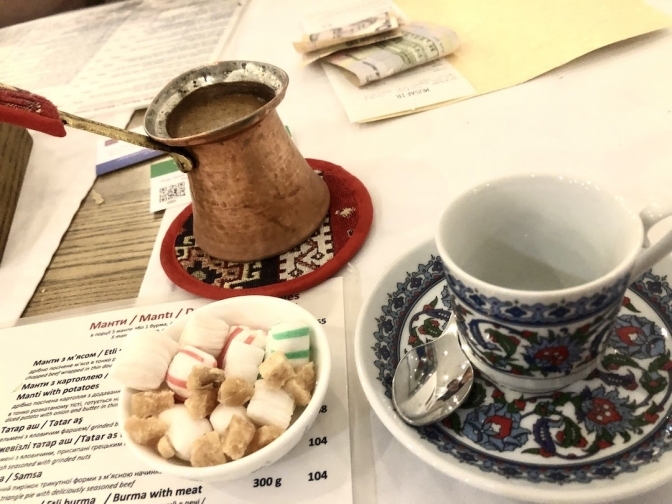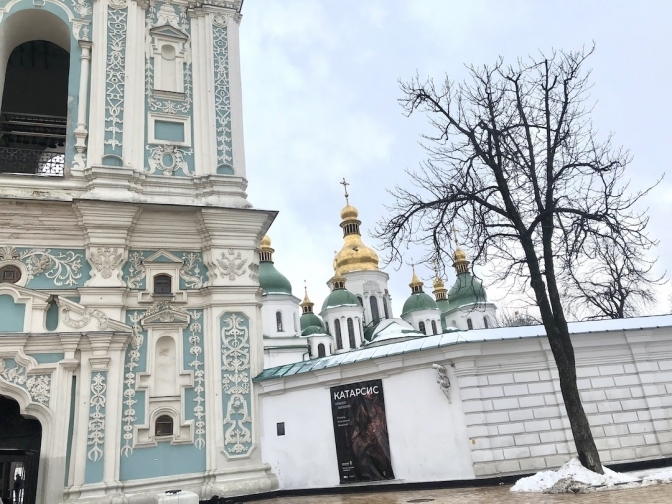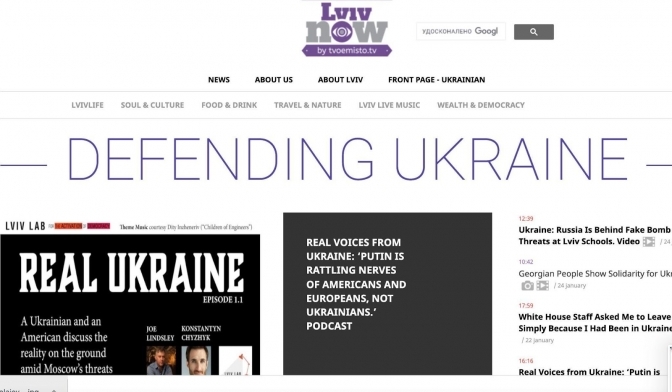
Kyiv – «How’s your mood?’ a friend, a blues musician, from Sweden texted me. «And how’s the vibe in ukraine? Scary?»
«How’s your mood» is a phrase that Ukrainians say–»yak nastriy» in the Ukrainian language. Ever since I told my friend Erik the Swede about it, we’ll each ask each other that question now and then. And my mood here in Kyiv, the Ukrainian capital, is strange, a mixture of good memories, some foreboding, and a strange dreamlike state that makes me ask, «What the hell is going on? Is this real?»
You can listen to the Swede’s music here
I arrived here yesterday via the midnight train from Lviv where have been living two years in an idyllic pandemic exile. Lviv in the far west is just 70 miles from Poland. Tonight, I’ll take another midnight train to the city of Kharkiv, Ukraine just 21 miles from Russia. This mission: to learn the mood across the country.
I am taking this journey with my reporter colleague Vitalii Holich just as Washington ordered mandatory evacuation of families of some diplomats. To my great surprise, even some officials evacuated Friday, suggesting this is serious. I asked one of these people, «Do you think I’m crazy to be going to Kharkiv?»
«No, you need to while you can, and you still have time,» the person said.
In Lviv, the mood is generally as it always is, or as it has been the pandemic. There’s bemused frustration but there’s still been music in the snowy streets, laughter in the cafés. Leopolitans tend to have family in villages or they know the mountains well enough. They know how to survive, where to send their families, how to fight. But in the metropolis of Kyiv, Europe’s seventh largest city, surrounded by the plains of central Ukraine, the big city people have less of an idea where to go, what to do.

St. Sophia of Kyiv, more than 1,000 years ago, in the historic centre of Slavic spirituality.
Speaking with the staff at Urban Space 500 cafe in Kyiv yesterday, I asked, «What’s the mood here? Are things calm?»
One watier laughed. «Ne duzhe!» [«Not very!»], he said. «The mood is anxiety. But our president said the other day we won’t be invaded so we are calmer now, but the anxiety doesn’t go away.»
«I’m trying to figure out where to go,» he said.
«What are your options?» he asked.
«I don’t know. In Lviv, you go to the mountains. In Kyiv we go to the bars.»
A girl, the manager, approached. She, too, felt anxious but she had a cheerful confidence.
«We’ll fight,» she said, with a smile.
Next I met for coffee with Arthur Kharytonov, the leader of Ukraine’s fledgling Liberal Democrat party and the founder of the Free Hong Kong Center in Kyiv. His center has been monitoring the work and plans of Beijing and Moscow for several years, and I wanted to see his mood in this moment.
Read more: «Interview with Arthur Kharytonov: In Ukraine-China Relations, Where Goes the Spirit of Maidan?»
«Without Chinese permission, it’s impossible for Russia to attack. [Because] what would Russia do in total isolation?»
He also noted how lately Beijing has increased its interest in Ukraine, both for the country’s resources and in order to have a clear trade route to Europe. In the early months of the pandemic, in July 2020, Beijing initiated a weekly cargo train from Wuhan to Kyiv.
«What is more possible? It’s that Russia and China will agree to attack Ukraine and Taiwan together. But when will China feel full of resources to start [such] a global war.»
As I left the coffee shop and turned onto the majestic sweep of the wide, curved Boulevard Kheschatyk, my brain was weary. It was a gray snowy day, and on such a day, this city’s streets, green and lovely in the spring, time-travels back to days of Soviet misery. All the talk of war, all the uncertainty, coupled with me leaving the cozy city of Lviv for the first time in many months: suddenly it seemed a dream was over and I was back in reality. Or maybe I was not in some kind of nightmare, like something out of a psychedelic Soviet mushroom cartoon.
I was tired of many things. On the train, while my colleagues slept, I’d had a nightmare in which I couldn’t as hard as I tried talk or communicate and so I hadn’t slept much. But I went to meet two friends and colleagues for dinner.
We went to the restaurant Musafir, run by Crimean Tartars, in exile from the Crimean peninsula ever since Moscow occupied that Ukrainian territory in 2014. The place was bright and bustling, I heard singing in a back room occasionally, and the waitresses wearing veils over their hair were cheerful. We ate the amazing food, the boiled flat bread filled with a thin layer of mutton or cheese, nourishing red lentil soup, matched with Sicilian wine we’d brought in.
We all agreed not to talk about Russia or reporting. We were worn out from these topics. In times of stress you need moments to pause.
Afterward, I leaned back in the cushioned bench, designed for leaning back. The waitress thoughtfully prepared the coffee accoutrements: a small colorful plate, a tiny colorful cup. She returned to put an embroidered coaster on the table, and then atop that she placed the copper kettle, the ibrik. She pulled another piece of embroidery from her apron and slipped it on the kettle’s handle.
Inspired by this tiny detailed meditative ritual, I poured the coffee from the ibrik into the tiny cup and before drinking, I for a minute only smelled the clove and lemon peel coffee. In between every sip, I repeated this smelling meditation.
The three of us were not talking and I was thinking, remembering past times in Kyiv.
Several years ago, when I used to visit Kyiv, before I had ever been to Lviv, we had a great crew of Americans who lived here and worked for the State or Defense Departments or think tanks or their own companies. We used to have dinner parties at their flats, usually with intriguing Ukrainian guests.
Sure, we talked a lot of Russia, but those were days of ease, of calm conversation, even of optimism for Ukraine. As I walk the streets of Kyiv now, when I see a place where we all used to gather, I can hear those old conversations. I wish those people were here now. One of the last of them just evacuated hours ago.
But minus those Americans, the city is still alive! I write this the following day, back at another branch of the Musafir café, Friday afternoon 4pm. It’s bustling. People are having a little wine or coffee, laughing, talking. No seems scared.
In 2018, inspired by the life of Anthony Bourdain, I set off a week after he died with a one-way ticket to Budapest. This inaugurated years of adventure that brought me eventually to Ukraine, and to the last time I flew in a plane, the last day of February 2022. I had admired how Bourdain related to people, how he listened to them, and how he shared their stories.
Those travels brought me contacts and sources all over the world, people I hear from now as they read the news of Ukraine, such as my friend Erik the Swede.
Within a few weeks of leaving JFK I found myself for the first time in Ukraine, in Kyiv. Little did I know that that providential first visit would have led to living here in pandemic exile and now, in this moment, knowing I must be here, knowing I want to be here.
Find more stories about the Russia threats at our Defending Ukraine page.

Joe Lindsley, an American journalist (follow on Instagram or LinkedIn), is editor of Lviv Now.
Follow Lviv Now on Facebook and Instagram. To receive our weekly email digest of stories, please follow us on Substack.
Lviv Now is an English-language website for Lviv, Ukraine’s «tech-friendly cultural hub.» It is produced by Tvoe Misto («Your City») media-hub, which also hosts regular problem-solving public forums to benefit the city and its people.











